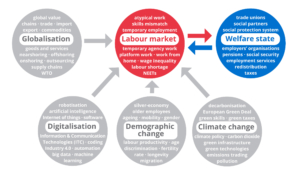
Agnieszka Chłoń-Domińczak
Warsaw School of Economics
Andrew Clark
PSE
Aída Ponce Del Castillo
The European Trade Union Institute
Mario Pianta
Scuola Normale Superiore
WeLaR is an interdisciplinary research project by social scientists from nine universities and research institutes around Europe. We will investigate the impact of demographic changes, globalisation, digitalisation and climate change on labour markets and welfare states in Europe in order to:
Demographic shifts, globalisation, digitalisation and climate change are transforming existing jobs and giving rise to new forms of work. These megatrends have an impact on welfare states. European welfare states offer some of the world’s best social protection, standards of living and working conditions, and these efforts represent a significant share of government spending. Yet, the four megatrends are putting pressure on the labour market and welfare states, creating winners and losers and contributing to the rise of inequalities within and between countries. For example, new forms of work may provide opportunities for vulnerable workers, but these jobs may be of poor quality and only partially covered by the welfare state. Such employment structures may also contribute less to the funding of welfare state, potentially undermining its sustainability in the longer run. Already shaken by the global financial crisis and the COVID-19 pandemic, welfare states now find themselves facing even greater challenges.
We will develop a new framework to study the effects of the four megatrends on the labour market and the welfare state. We will integrate the analysis of their impacts on labour supply, labour demand and labour market matching, while accounting for the interactions between the four megatrends and the mediating role of institutions and policies. WeLaR will use a mix of quantitative and qualitative methods, as well as stakeholder engagement.
24 research papers / 4 policy briefs / 1 foresight report
2 conferences / 6 workshops / 6 roundtables / 4 open virtual café sessions